BUSI-1695: Analyzing Culture's Impact on International Business
VerifiedAdded on 2023/01/17
|7
|2190
|60
Report
AI Summary
This report delves into the significant influence of culture on international business, focusing on how cultural elements shape the global business environment and decision-making processes. The report uses the case study of Diebold Nixdorf, an international retail technology and financial organization, to illustrate these concepts. It explores key international business elements such as organizational culture and the impact of cultural dimensions, including power distance, uncertainty avoidance, individualism, and masculinity, as defined by Hofstede's cultural dimensions theory. The analysis highlights how these cultural factors affect workplace environments and business strategies. The report concludes by emphasizing the importance of understanding cultural differences for companies like Diebold, especially when expanding into new markets, and stresses the need for cultural research to ensure business growth and success.
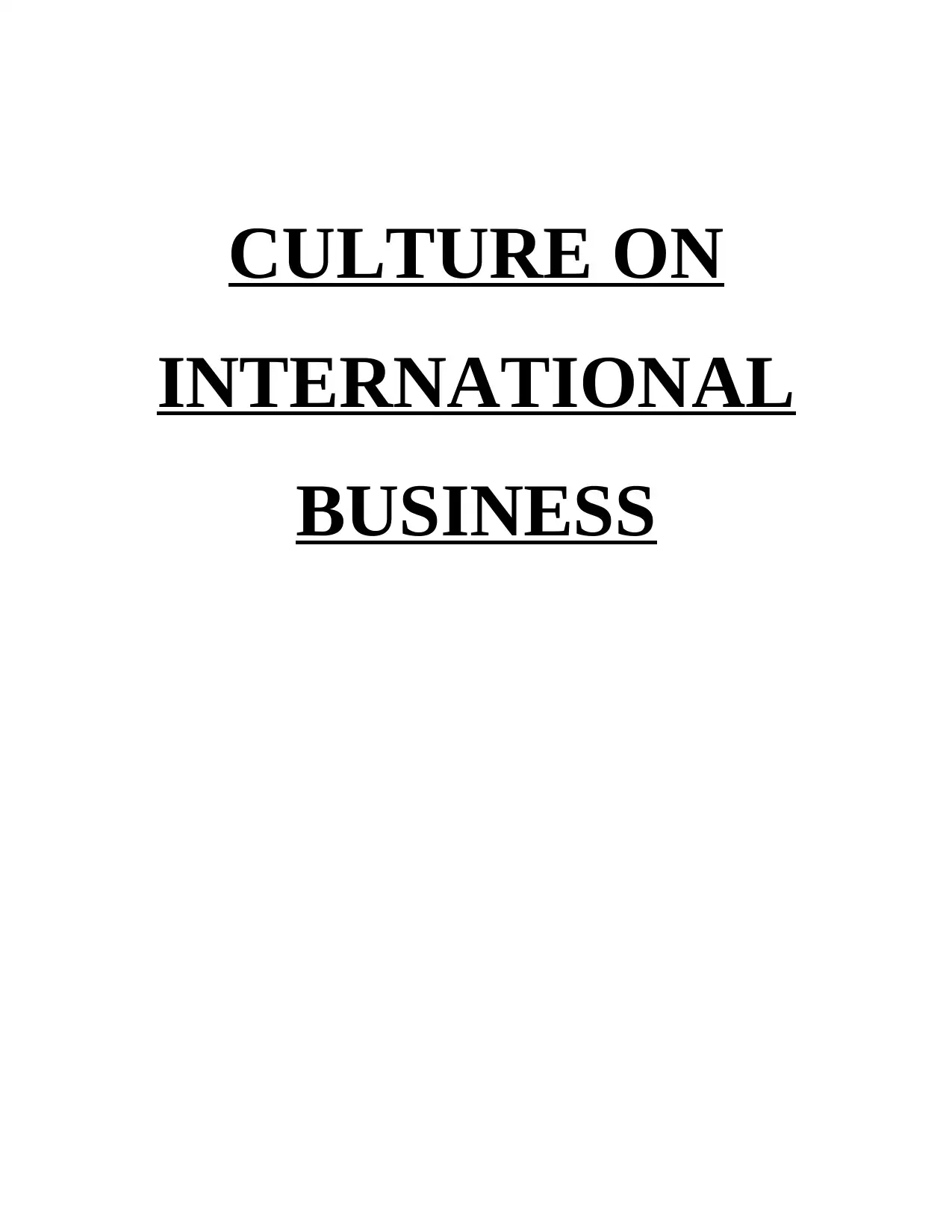
CULTURE ON
INTERNATIONAL
BUSINESS
INTERNATIONAL
BUSINESS
Paraphrase This Document
Need a fresh take? Get an instant paraphrase of this document with our AI Paraphraser
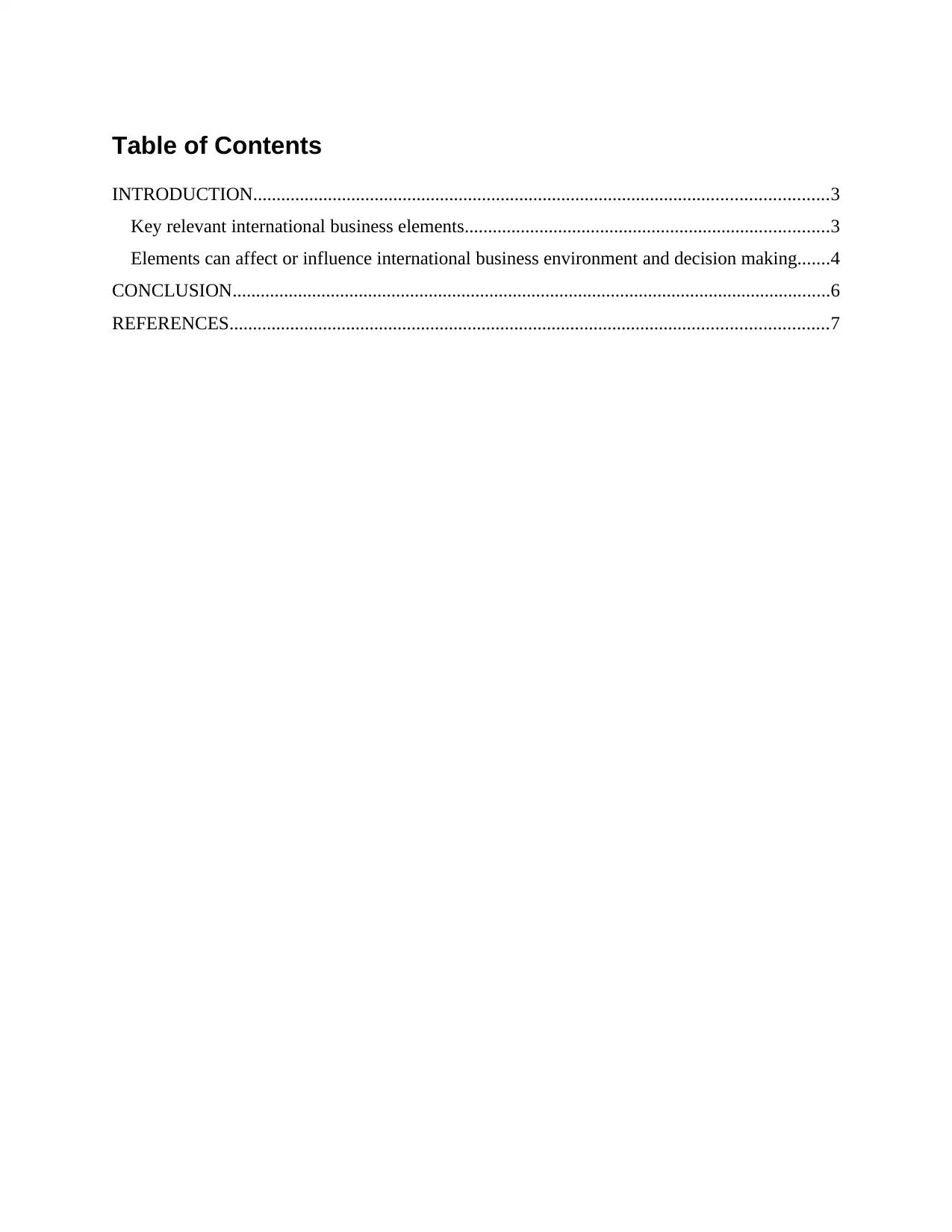
Table of Contents
INTRODUCTION...........................................................................................................................3
Key relevant international business elements..............................................................................3
Elements can affect or influence international business environment and decision making.......4
CONCLUSION................................................................................................................................6
REFERENCES................................................................................................................................7
INTRODUCTION...........................................................................................................................3
Key relevant international business elements..............................................................................3
Elements can affect or influence international business environment and decision making.......4
CONCLUSION................................................................................................................................6
REFERENCES................................................................................................................................7
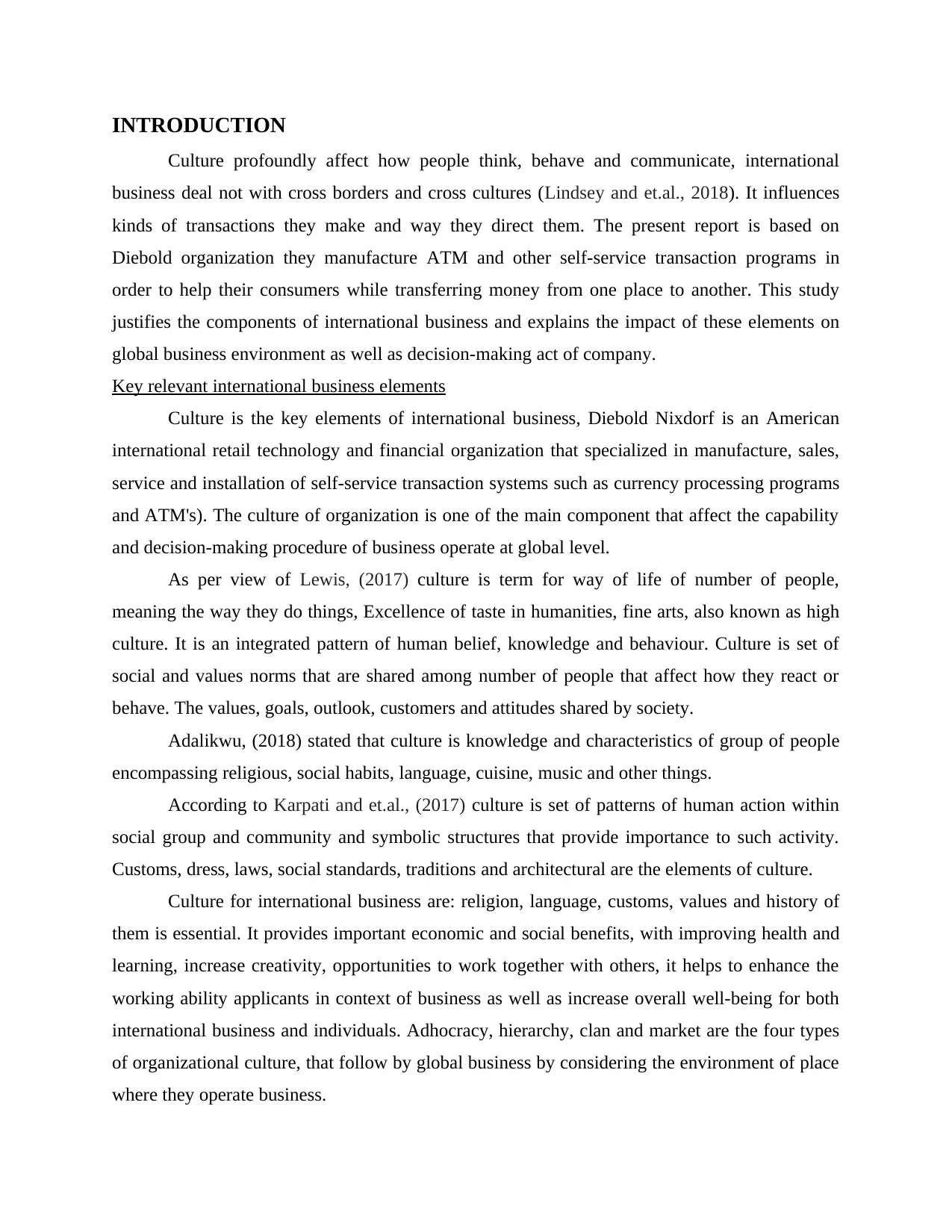
INTRODUCTION
Culture profoundly affect how people think, behave and communicate, international
business deal not with cross borders and cross cultures (Lindsey and et.al., 2018). It influences
kinds of transactions they make and way they direct them. The present report is based on
Diebold organization they manufacture ATM and other self-service transaction programs in
order to help their consumers while transferring money from one place to another. This study
justifies the components of international business and explains the impact of these elements on
global business environment as well as decision-making act of company.
Key relevant international business elements
Culture is the key elements of international business, Diebold Nixdorf is an American
international retail technology and financial organization that specialized in manufacture, sales,
service and installation of self-service transaction systems such as currency processing programs
and ATM's). The culture of organization is one of the main component that affect the capability
and decision-making procedure of business operate at global level.
As per view of Lewis, (2017) culture is term for way of life of number of people,
meaning the way they do things, Excellence of taste in humanities, fine arts, also known as high
culture. It is an integrated pattern of human belief, knowledge and behaviour. Culture is set of
social and values norms that are shared among number of people that affect how they react or
behave. The values, goals, outlook, customers and attitudes shared by society.
Adalikwu, (2018) stated that culture is knowledge and characteristics of group of people
encompassing religious, social habits, language, cuisine, music and other things.
According to Karpati and et.al., (2017) culture is set of patterns of human action within
social group and community and symbolic structures that provide importance to such activity.
Customs, dress, laws, social standards, traditions and architectural are the elements of culture.
Culture for international business are: religion, language, customs, values and history of
them is essential. It provides important economic and social benefits, with improving health and
learning, increase creativity, opportunities to work together with others, it helps to enhance the
working ability applicants in context of business as well as increase overall well-being for both
international business and individuals. Adhocracy, hierarchy, clan and market are the four types
of organizational culture, that follow by global business by considering the environment of place
where they operate business.
Culture profoundly affect how people think, behave and communicate, international
business deal not with cross borders and cross cultures (Lindsey and et.al., 2018). It influences
kinds of transactions they make and way they direct them. The present report is based on
Diebold organization they manufacture ATM and other self-service transaction programs in
order to help their consumers while transferring money from one place to another. This study
justifies the components of international business and explains the impact of these elements on
global business environment as well as decision-making act of company.
Key relevant international business elements
Culture is the key elements of international business, Diebold Nixdorf is an American
international retail technology and financial organization that specialized in manufacture, sales,
service and installation of self-service transaction systems such as currency processing programs
and ATM's). The culture of organization is one of the main component that affect the capability
and decision-making procedure of business operate at global level.
As per view of Lewis, (2017) culture is term for way of life of number of people,
meaning the way they do things, Excellence of taste in humanities, fine arts, also known as high
culture. It is an integrated pattern of human belief, knowledge and behaviour. Culture is set of
social and values norms that are shared among number of people that affect how they react or
behave. The values, goals, outlook, customers and attitudes shared by society.
Adalikwu, (2018) stated that culture is knowledge and characteristics of group of people
encompassing religious, social habits, language, cuisine, music and other things.
According to Karpati and et.al., (2017) culture is set of patterns of human action within
social group and community and symbolic structures that provide importance to such activity.
Customs, dress, laws, social standards, traditions and architectural are the elements of culture.
Culture for international business are: religion, language, customs, values and history of
them is essential. It provides important economic and social benefits, with improving health and
learning, increase creativity, opportunities to work together with others, it helps to enhance the
working ability applicants in context of business as well as increase overall well-being for both
international business and individuals. Adhocracy, hierarchy, clan and market are the four types
of organizational culture, that follow by global business by considering the environment of place
where they operate business.
⊘ This is a preview!⊘
Do you want full access?
Subscribe today to unlock all pages.

Trusted by 1+ million students worldwide
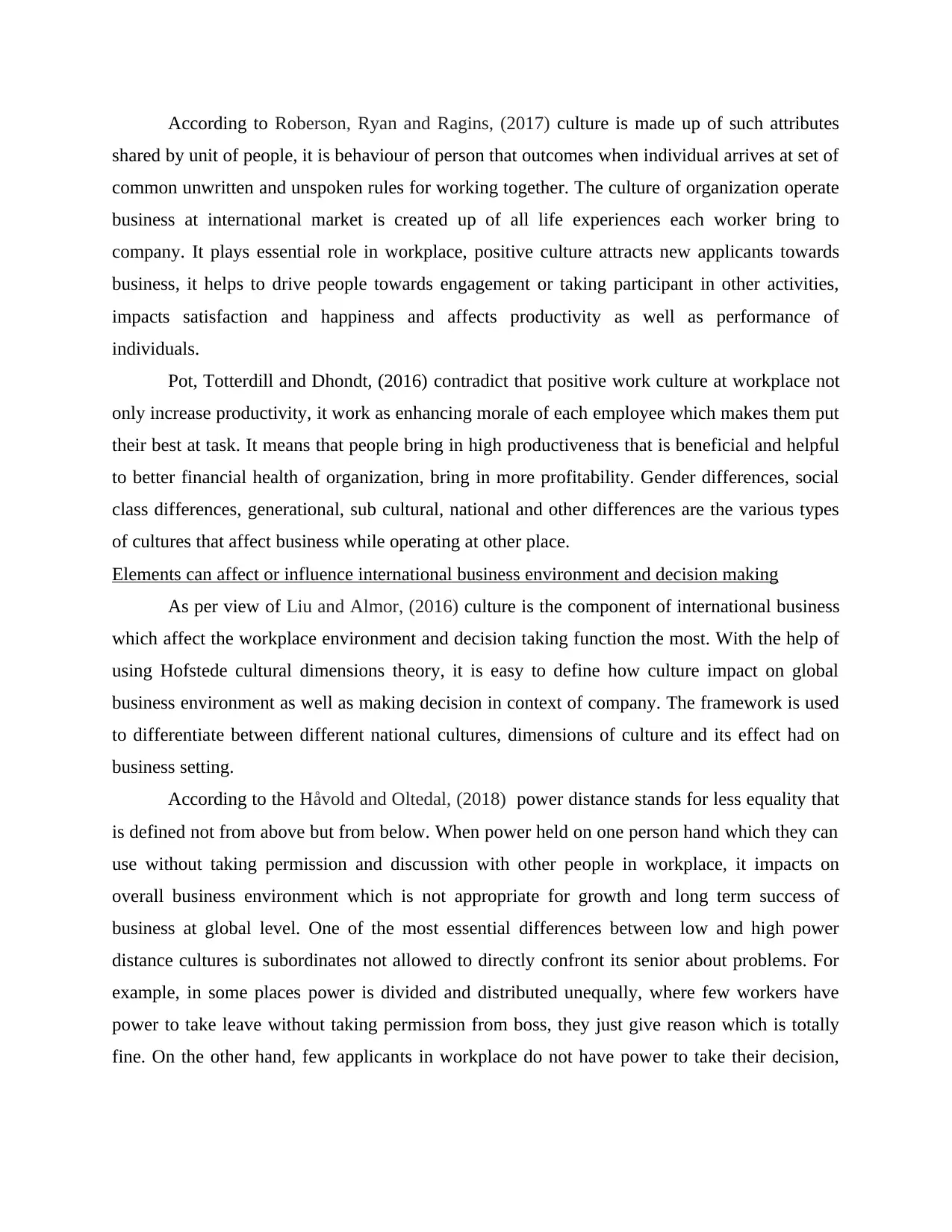
According to Roberson, Ryan and Ragins, (2017) culture is made up of such attributes
shared by unit of people, it is behaviour of person that outcomes when individual arrives at set of
common unwritten and unspoken rules for working together. The culture of organization operate
business at international market is created up of all life experiences each worker bring to
company. It plays essential role in workplace, positive culture attracts new applicants towards
business, it helps to drive people towards engagement or taking participant in other activities,
impacts satisfaction and happiness and affects productivity as well as performance of
individuals.
Pot, Totterdill and Dhondt, (2016) contradict that positive work culture at workplace not
only increase productivity, it work as enhancing morale of each employee which makes them put
their best at task. It means that people bring in high productiveness that is beneficial and helpful
to better financial health of organization, bring in more profitability. Gender differences, social
class differences, generational, sub cultural, national and other differences are the various types
of cultures that affect business while operating at other place.
Elements can affect or influence international business environment and decision making
As per view of Liu and Almor, (2016) culture is the component of international business
which affect the workplace environment and decision taking function the most. With the help of
using Hofstede cultural dimensions theory, it is easy to define how culture impact on global
business environment as well as making decision in context of company. The framework is used
to differentiate between different national cultures, dimensions of culture and its effect had on
business setting.
According to the Håvold and Oltedal, (2018) power distance stands for less equality that
is defined not from above but from below. When power held on one person hand which they can
use without taking permission and discussion with other people in workplace, it impacts on
overall business environment which is not appropriate for growth and long term success of
business at global level. One of the most essential differences between low and high power
distance cultures is subordinates not allowed to directly confront its senior about problems. For
example, in some places power is divided and distributed unequally, where few workers have
power to take leave without taking permission from boss, they just give reason which is totally
fine. On the other hand, few applicants in workplace do not have power to take their decision,
shared by unit of people, it is behaviour of person that outcomes when individual arrives at set of
common unwritten and unspoken rules for working together. The culture of organization operate
business at international market is created up of all life experiences each worker bring to
company. It plays essential role in workplace, positive culture attracts new applicants towards
business, it helps to drive people towards engagement or taking participant in other activities,
impacts satisfaction and happiness and affects productivity as well as performance of
individuals.
Pot, Totterdill and Dhondt, (2016) contradict that positive work culture at workplace not
only increase productivity, it work as enhancing morale of each employee which makes them put
their best at task. It means that people bring in high productiveness that is beneficial and helpful
to better financial health of organization, bring in more profitability. Gender differences, social
class differences, generational, sub cultural, national and other differences are the various types
of cultures that affect business while operating at other place.
Elements can affect or influence international business environment and decision making
As per view of Liu and Almor, (2016) culture is the component of international business
which affect the workplace environment and decision taking function the most. With the help of
using Hofstede cultural dimensions theory, it is easy to define how culture impact on global
business environment as well as making decision in context of company. The framework is used
to differentiate between different national cultures, dimensions of culture and its effect had on
business setting.
According to the Håvold and Oltedal, (2018) power distance stands for less equality that
is defined not from above but from below. When power held on one person hand which they can
use without taking permission and discussion with other people in workplace, it impacts on
overall business environment which is not appropriate for growth and long term success of
business at global level. One of the most essential differences between low and high power
distance cultures is subordinates not allowed to directly confront its senior about problems. For
example, in some places power is divided and distributed unequally, where few workers have
power to take leave without taking permission from boss, they just give reason which is totally
fine. On the other hand, few applicants in workplace do not have power to take their decision,
Paraphrase This Document
Need a fresh take? Get an instant paraphrase of this document with our AI Paraphraser
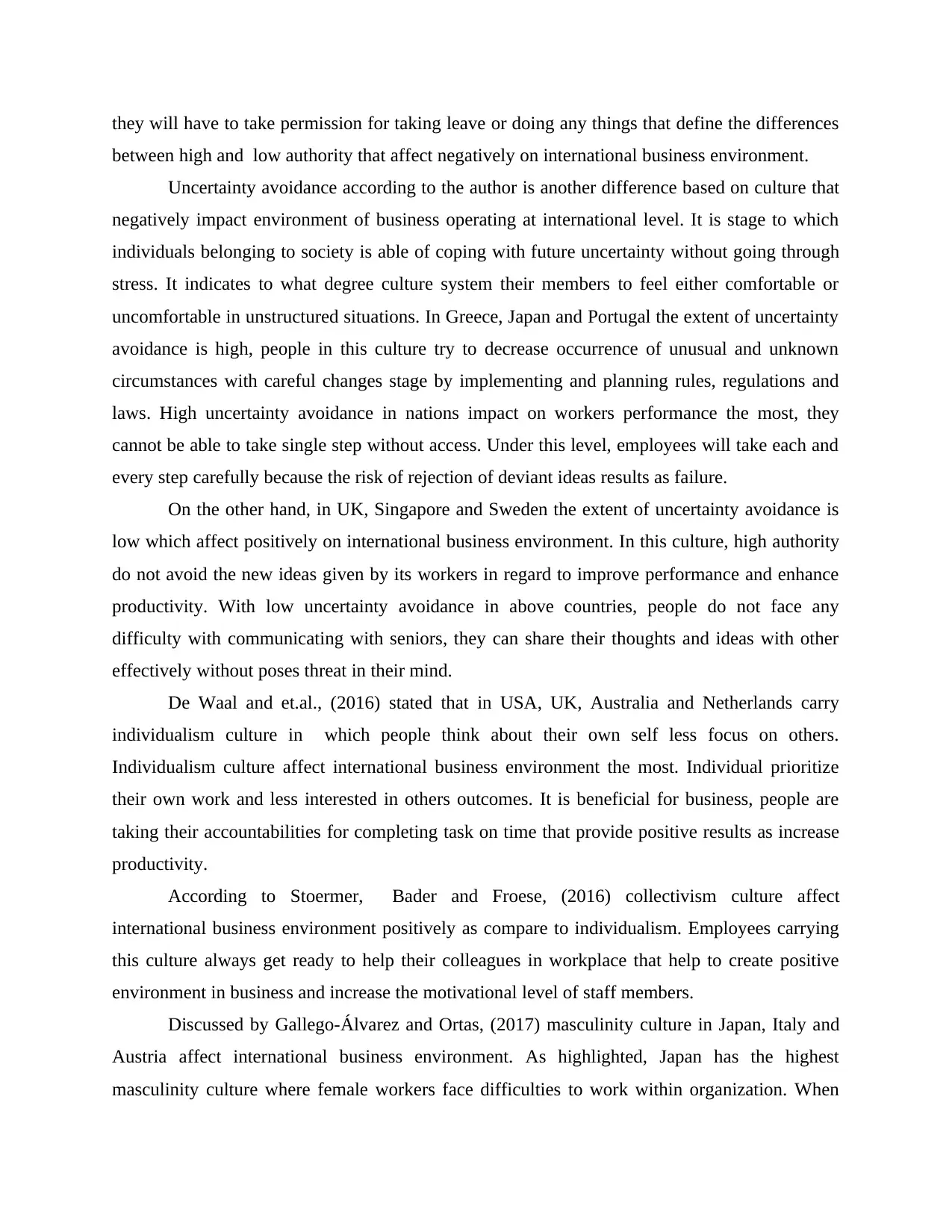
they will have to take permission for taking leave or doing any things that define the differences
between high and low authority that affect negatively on international business environment.
Uncertainty avoidance according to the author is another difference based on culture that
negatively impact environment of business operating at international level. It is stage to which
individuals belonging to society is able of coping with future uncertainty without going through
stress. It indicates to what degree culture system their members to feel either comfortable or
uncomfortable in unstructured situations. In Greece, Japan and Portugal the extent of uncertainty
avoidance is high, people in this culture try to decrease occurrence of unusual and unknown
circumstances with careful changes stage by implementing and planning rules, regulations and
laws. High uncertainty avoidance in nations impact on workers performance the most, they
cannot be able to take single step without access. Under this level, employees will take each and
every step carefully because the risk of rejection of deviant ideas results as failure.
On the other hand, in UK, Singapore and Sweden the extent of uncertainty avoidance is
low which affect positively on international business environment. In this culture, high authority
do not avoid the new ideas given by its workers in regard to improve performance and enhance
productivity. With low uncertainty avoidance in above countries, people do not face any
difficulty with communicating with seniors, they can share their thoughts and ideas with other
effectively without poses threat in their mind.
De Waal and et.al., (2016) stated that in USA, UK, Australia and Netherlands carry
individualism culture in which people think about their own self less focus on others.
Individualism culture affect international business environment the most. Individual prioritize
their own work and less interested in others outcomes. It is beneficial for business, people are
taking their accountabilities for completing task on time that provide positive results as increase
productivity.
According to Stoermer, Bader and Froese, (2016) collectivism culture affect
international business environment positively as compare to individualism. Employees carrying
this culture always get ready to help their colleagues in workplace that help to create positive
environment in business and increase the motivational level of staff members.
Discussed by Gallego-Álvarez and Ortas, (2017) masculinity culture in Japan, Italy and
Austria affect international business environment. As highlighted, Japan has the highest
masculinity culture where female workers face difficulties to work within organization. When
between high and low authority that affect negatively on international business environment.
Uncertainty avoidance according to the author is another difference based on culture that
negatively impact environment of business operating at international level. It is stage to which
individuals belonging to society is able of coping with future uncertainty without going through
stress. It indicates to what degree culture system their members to feel either comfortable or
uncomfortable in unstructured situations. In Greece, Japan and Portugal the extent of uncertainty
avoidance is high, people in this culture try to decrease occurrence of unusual and unknown
circumstances with careful changes stage by implementing and planning rules, regulations and
laws. High uncertainty avoidance in nations impact on workers performance the most, they
cannot be able to take single step without access. Under this level, employees will take each and
every step carefully because the risk of rejection of deviant ideas results as failure.
On the other hand, in UK, Singapore and Sweden the extent of uncertainty avoidance is
low which affect positively on international business environment. In this culture, high authority
do not avoid the new ideas given by its workers in regard to improve performance and enhance
productivity. With low uncertainty avoidance in above countries, people do not face any
difficulty with communicating with seniors, they can share their thoughts and ideas with other
effectively without poses threat in their mind.
De Waal and et.al., (2016) stated that in USA, UK, Australia and Netherlands carry
individualism culture in which people think about their own self less focus on others.
Individualism culture affect international business environment the most. Individual prioritize
their own work and less interested in others outcomes. It is beneficial for business, people are
taking their accountabilities for completing task on time that provide positive results as increase
productivity.
According to Stoermer, Bader and Froese, (2016) collectivism culture affect
international business environment positively as compare to individualism. Employees carrying
this culture always get ready to help their colleagues in workplace that help to create positive
environment in business and increase the motivational level of staff members.
Discussed by Gallego-Álvarez and Ortas, (2017) masculinity culture in Japan, Italy and
Austria affect international business environment. As highlighted, Japan has the highest
masculinity culture where female workers face difficulties to work within organization. When
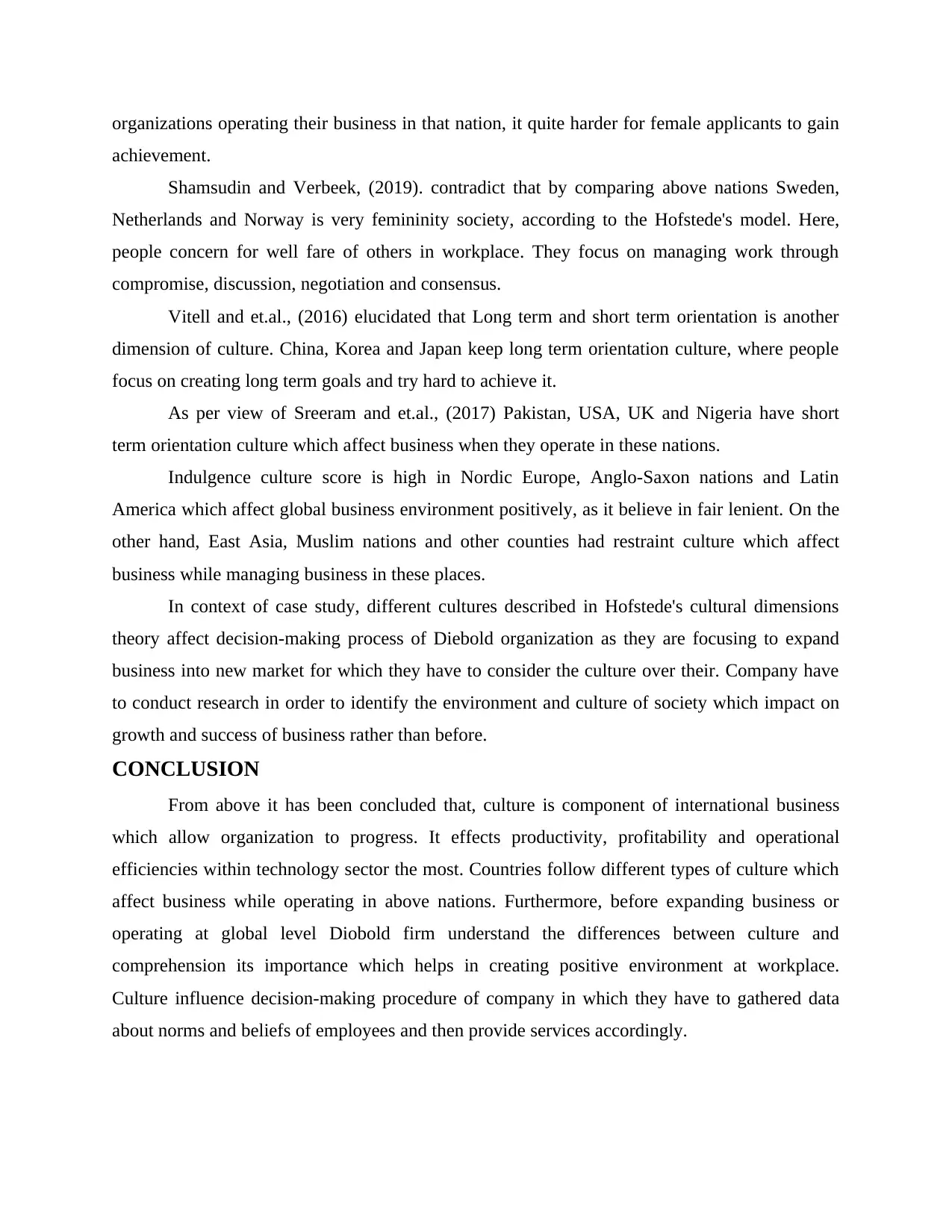
organizations operating their business in that nation, it quite harder for female applicants to gain
achievement.
Shamsudin and Verbeek, (2019). contradict that by comparing above nations Sweden,
Netherlands and Norway is very femininity society, according to the Hofstede's model. Here,
people concern for well fare of others in workplace. They focus on managing work through
compromise, discussion, negotiation and consensus.
Vitell and et.al., (2016) elucidated that Long term and short term orientation is another
dimension of culture. China, Korea and Japan keep long term orientation culture, where people
focus on creating long term goals and try hard to achieve it.
As per view of Sreeram and et.al., (2017) Pakistan, USA, UK and Nigeria have short
term orientation culture which affect business when they operate in these nations.
Indulgence culture score is high in Nordic Europe, Anglo-Saxon nations and Latin
America which affect global business environment positively, as it believe in fair lenient. On the
other hand, East Asia, Muslim nations and other counties had restraint culture which affect
business while managing business in these places.
In context of case study, different cultures described in Hofstede's cultural dimensions
theory affect decision-making process of Diebold organization as they are focusing to expand
business into new market for which they have to consider the culture over their. Company have
to conduct research in order to identify the environment and culture of society which impact on
growth and success of business rather than before.
CONCLUSION
From above it has been concluded that, culture is component of international business
which allow organization to progress. It effects productivity, profitability and operational
efficiencies within technology sector the most. Countries follow different types of culture which
affect business while operating in above nations. Furthermore, before expanding business or
operating at global level Diobold firm understand the differences between culture and
comprehension its importance which helps in creating positive environment at workplace.
Culture influence decision-making procedure of company in which they have to gathered data
about norms and beliefs of employees and then provide services accordingly.
achievement.
Shamsudin and Verbeek, (2019). contradict that by comparing above nations Sweden,
Netherlands and Norway is very femininity society, according to the Hofstede's model. Here,
people concern for well fare of others in workplace. They focus on managing work through
compromise, discussion, negotiation and consensus.
Vitell and et.al., (2016) elucidated that Long term and short term orientation is another
dimension of culture. China, Korea and Japan keep long term orientation culture, where people
focus on creating long term goals and try hard to achieve it.
As per view of Sreeram and et.al., (2017) Pakistan, USA, UK and Nigeria have short
term orientation culture which affect business when they operate in these nations.
Indulgence culture score is high in Nordic Europe, Anglo-Saxon nations and Latin
America which affect global business environment positively, as it believe in fair lenient. On the
other hand, East Asia, Muslim nations and other counties had restraint culture which affect
business while managing business in these places.
In context of case study, different cultures described in Hofstede's cultural dimensions
theory affect decision-making process of Diebold organization as they are focusing to expand
business into new market for which they have to consider the culture over their. Company have
to conduct research in order to identify the environment and culture of society which impact on
growth and success of business rather than before.
CONCLUSION
From above it has been concluded that, culture is component of international business
which allow organization to progress. It effects productivity, profitability and operational
efficiencies within technology sector the most. Countries follow different types of culture which
affect business while operating in above nations. Furthermore, before expanding business or
operating at global level Diobold firm understand the differences between culture and
comprehension its importance which helps in creating positive environment at workplace.
Culture influence decision-making procedure of company in which they have to gathered data
about norms and beliefs of employees and then provide services accordingly.
⊘ This is a preview!⊘
Do you want full access?
Subscribe today to unlock all pages.

Trusted by 1+ million students worldwide
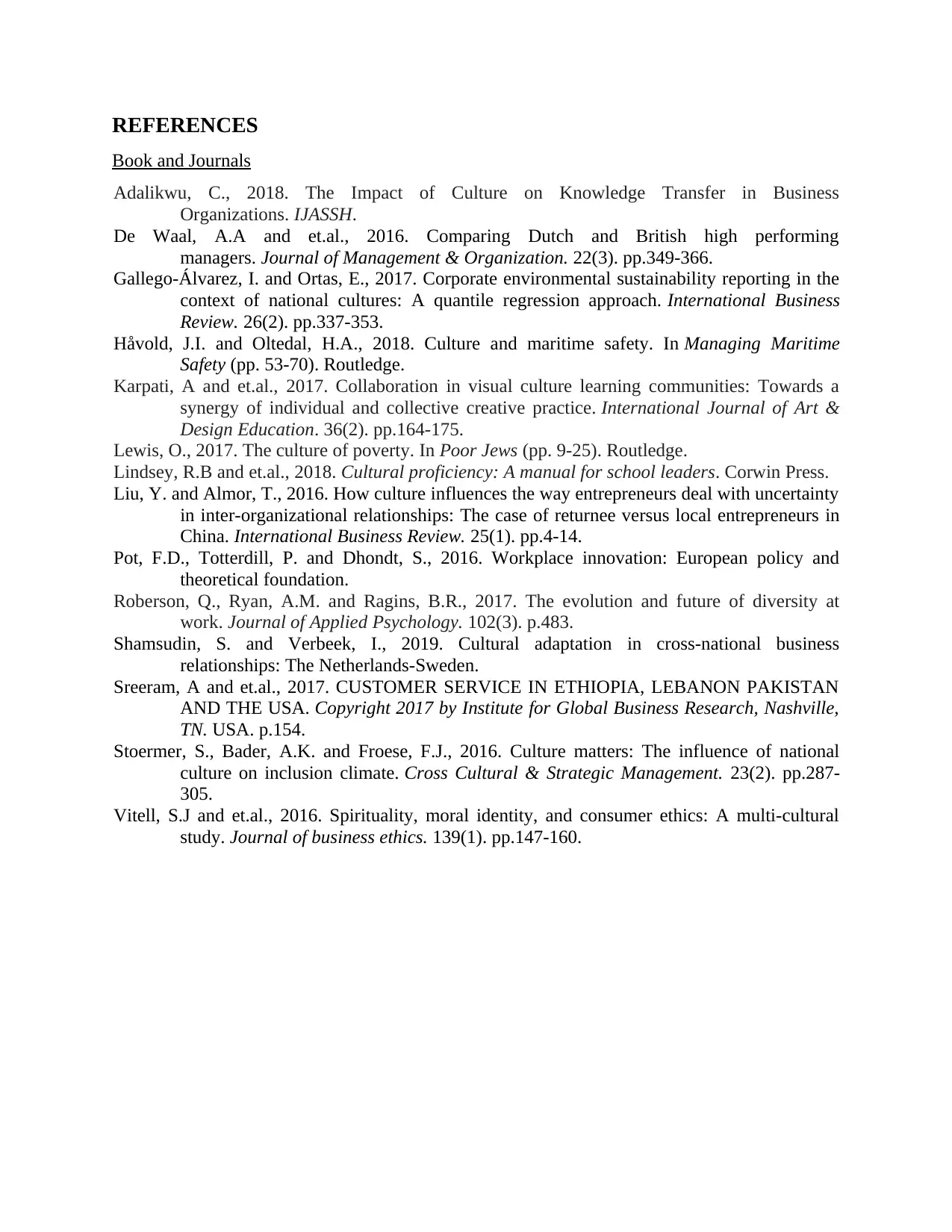
REFERENCES
Book and Journals
Adalikwu, C., 2018. The Impact of Culture on Knowledge Transfer in Business
Organizations. IJASSH.
De Waal, A.A and et.al., 2016. Comparing Dutch and British high performing
managers. Journal of Management & Organization. 22(3). pp.349-366.
Gallego-Álvarez, I. and Ortas, E., 2017. Corporate environmental sustainability reporting in the
context of national cultures: A quantile regression approach. International Business
Review. 26(2). pp.337-353.
Håvold, J.I. and Oltedal, H.A., 2018. Culture and maritime safety. In Managing Maritime
Safety (pp. 53-70). Routledge.
Karpati, A and et.al., 2017. Collaboration in visual culture learning communities: Towards a
synergy of individual and collective creative practice. International Journal of Art &
Design Education. 36(2). pp.164-175.
Lewis, O., 2017. The culture of poverty. In Poor Jews (pp. 9-25). Routledge.
Lindsey, R.B and et.al., 2018. Cultural proficiency: A manual for school leaders. Corwin Press.
Liu, Y. and Almor, T., 2016. How culture influences the way entrepreneurs deal with uncertainty
in inter-organizational relationships: The case of returnee versus local entrepreneurs in
China. International Business Review. 25(1). pp.4-14.
Pot, F.D., Totterdill, P. and Dhondt, S., 2016. Workplace innovation: European policy and
theoretical foundation.
Roberson, Q., Ryan, A.M. and Ragins, B.R., 2017. The evolution and future of diversity at
work. Journal of Applied Psychology. 102(3). p.483.
Shamsudin, S. and Verbeek, I., 2019. Cultural adaptation in cross-national business
relationships: The Netherlands-Sweden.
Sreeram, A and et.al., 2017. CUSTOMER SERVICE IN ETHIOPIA, LEBANON PAKISTAN
AND THE USA. Copyright 2017 by Institute for Global Business Research, Nashville,
TN. USA. p.154.
Stoermer, S., Bader, A.K. and Froese, F.J., 2016. Culture matters: The influence of national
culture on inclusion climate. Cross Cultural & Strategic Management. 23(2). pp.287-
305.
Vitell, S.J and et.al., 2016. Spirituality, moral identity, and consumer ethics: A multi-cultural
study. Journal of business ethics. 139(1). pp.147-160.
Book and Journals
Adalikwu, C., 2018. The Impact of Culture on Knowledge Transfer in Business
Organizations. IJASSH.
De Waal, A.A and et.al., 2016. Comparing Dutch and British high performing
managers. Journal of Management & Organization. 22(3). pp.349-366.
Gallego-Álvarez, I. and Ortas, E., 2017. Corporate environmental sustainability reporting in the
context of national cultures: A quantile regression approach. International Business
Review. 26(2). pp.337-353.
Håvold, J.I. and Oltedal, H.A., 2018. Culture and maritime safety. In Managing Maritime
Safety (pp. 53-70). Routledge.
Karpati, A and et.al., 2017. Collaboration in visual culture learning communities: Towards a
synergy of individual and collective creative practice. International Journal of Art &
Design Education. 36(2). pp.164-175.
Lewis, O., 2017. The culture of poverty. In Poor Jews (pp. 9-25). Routledge.
Lindsey, R.B and et.al., 2018. Cultural proficiency: A manual for school leaders. Corwin Press.
Liu, Y. and Almor, T., 2016. How culture influences the way entrepreneurs deal with uncertainty
in inter-organizational relationships: The case of returnee versus local entrepreneurs in
China. International Business Review. 25(1). pp.4-14.
Pot, F.D., Totterdill, P. and Dhondt, S., 2016. Workplace innovation: European policy and
theoretical foundation.
Roberson, Q., Ryan, A.M. and Ragins, B.R., 2017. The evolution and future of diversity at
work. Journal of Applied Psychology. 102(3). p.483.
Shamsudin, S. and Verbeek, I., 2019. Cultural adaptation in cross-national business
relationships: The Netherlands-Sweden.
Sreeram, A and et.al., 2017. CUSTOMER SERVICE IN ETHIOPIA, LEBANON PAKISTAN
AND THE USA. Copyright 2017 by Institute for Global Business Research, Nashville,
TN. USA. p.154.
Stoermer, S., Bader, A.K. and Froese, F.J., 2016. Culture matters: The influence of national
culture on inclusion climate. Cross Cultural & Strategic Management. 23(2). pp.287-
305.
Vitell, S.J and et.al., 2016. Spirituality, moral identity, and consumer ethics: A multi-cultural
study. Journal of business ethics. 139(1). pp.147-160.
1 out of 7
Related Documents
Your All-in-One AI-Powered Toolkit for Academic Success.
+13062052269
info@desklib.com
Available 24*7 on WhatsApp / Email
![[object Object]](/_next/static/media/star-bottom.7253800d.svg)
Unlock your academic potential
Copyright © 2020–2026 A2Z Services. All Rights Reserved. Developed and managed by ZUCOL.




